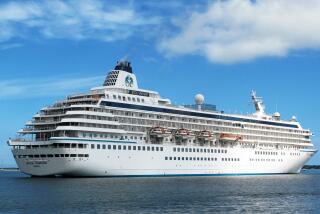Debate Rages in the Wake of Cruise for Gays
- Share via
NASSAU, Bahamas — The subject of Krissy Luv’s wildly popular radio talk show this week was the death penalty and crime. But a caller wanted to talk about what remains the hottest topic of the day here.
He wanted to know why, three full weeks after his government welcomed a cruise ship carrying 900 gay tourists into Bahamian waters--unleashing a torrent of protest in this devoutly Christian society--it had yet to explain its decision.
Luv’s reply: In a democratic nation that depends on tourism, welcomes all and discriminates against none, what’s to explain?
Besides, Luv said, “I don’t see how 900 gay men can destroy the moral character of the country.”
Thousands of voices have flooded talk shows and editorial pages throughout the Caribbean on an issue that has galvanized public opinion as far away as West Hollywood, the home base of the Atlantis Events tour operator that chartered the cruise.
The cruise ship Leeward--rejected by the fiercely conservative Cayman Islands before being thwarted only by bad weather in the Bahamas--is long gone, but the debate continues to rage in its wake:
At a time when these islands are more dependent on the tourist dollar than before, their traditionally conservative cultures are struggling to find a balance between money and morality, and examining their morality as well.
It is an issue that is likely to intensify, especially amid reports that another such cruise is scheduled to dock in the Bahamas in March.
Bishop Harcourt Pindar, president of the powerful Bahamas Christian Council that led a street protest against the Leeward’s landing, said the issue is “by no means” closed.
“If they say another ship like this is coming again, well, I say--and please forgive me--all hell will break loose,” the Pentecostal bishop said. “We will not stand idly by and let it happen.”
But it probably will.
Bahamas’ tourism minister, Cornelius A. Smith, said this week: “All visitors to our country will be welcome, and we will provide for them the services for which Bahamians are known worldwide.”
It is a policy of nondiscrimination, Smith said, that is basic to the Bahamas’ democracy and its booming tourist trade.
The nation has far outpaced all other Caribbean destinations, drawing more than 3.4 million visitors last year, and tourism has grown so global here that the government says its major competitors now are Orlando, Fla., and Las Vegas.
That huge foreign influx--and the Bahamas’ proximity to U.S. shores, just a little more than 50 miles away--has made Bahamian society one of the most sophisticated in the Caribbean.
But Smith acknowledged that he was not surprised by the outrage that his government’s decision provoked. This is a nation, after all, where there are more churches than bars and where a belief system has helped maintain a gentle innocence amid such strong foreign influence.
“We are a deeply religious country, and we live by certain standards and rules, and I expected the religious community would react the way they did. . . . Our challenge is that we must always be able to maintain our cultural identity but recognize that we must tolerate the presence of all tourists in our midst.”
Bishop Pindar and most Bahamians said they have tolerated gay visitors in the past. What offended some this time was that the Leeward’s visit was made so public.
“They were so brazen,” the bishop said. “It would have given license to their likings in our own society if the church had remained silent.”
Social critics such as Krissy Luv see a deeper challenge--and a profound lesson--emerging from the gay-cruise debate.
“The lesson is to really tune in and listen to our own society, for us to look at ourselves for what we are,” she said. “It really shows us that we have a lot of our own hang-ups still in place, and they can affect us in our pocketbooks.
“But our society also is very duplicitous,” she added. For instance, under a constitution that proclaims theirs a Christian country, Bahamians cannot gamble in the many legal casinos that help draw tourists here. But illegal betting flourishes in Nassau’s neighborhoods.
More to the point, homosexual acts are also against the law here. Yet there is a home-grown gay scene that the religious leaders admonish but clearly acknowledge. In fact, a gay bar opened recently in a Nassau shopping center. It’s next to a church, and it’s called the Endangered Species.
More to Read
Sign up for The Wild
We’ll help you find the best places to hike, bike and run, as well as the perfect silent spots for meditation and yoga.
You may occasionally receive promotional content from the Los Angeles Times.






